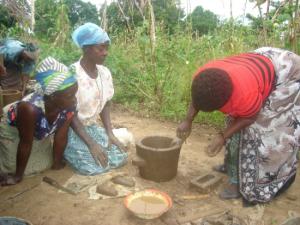The Importance of Education
Education has played an important role in many of the EF 1 projects. This has ranged, for instance, from educating beneficiaries on different aspects of energy efficiency, to building capacity of local and national decision makers, to enabling the provision of electricity in schools. The project from Malawi highlighted below involved a number of educational aspects which together led to improvements in access to energy and in local livelihoods.

Production of energy efficient Chitetezo Mbaula stoves, Malawi
This project aimed to contribute to the eradication of poverty by improving the access to and use of sustainable energy in Traditional Authority Msamala. To achieve this the project intended to increase local capacity for managing energy resources, increase the use of energy efficiency technology, increase the variety of sustainable businesses, and increase the collaboration between institutions and communities.
As a result of the project 9 health facilities have had energy efficient Esparanza stoves installed and 24,359 families have adopted energy efficient stoves (which reduce the use of fuel wood by 40%). Educational facilities have been enhanced with 20 primary schools having solar PV systems installed in classrooms and teachers’ houses. This has allowed study hours to be extended and assisted with teacher retention. Other educational results include improved literacy, with 1852 people participating in adult literacy classes and graduating as literate.
In terms of resource management, capacity building of village natural resource management committees has helped with the conservation of 504 ha of natural forests. In addition many community members have adopted agro forestry practices and 6.5 million trees have been planted in community/individual woodlots and seedling nurseries have been established.
Sustainable businesses also increased, with over 4,000 households engaging in non-extractive businesses and 800 businesses being established in households that previously relied on extractive businesses. As a result of this engagement in small scale businesses livelihoods have been increased.
For more information on this project, and all other EF projects, please see the ACP-EU EF Projects Database.
source: News, ACP-Energy Facility
